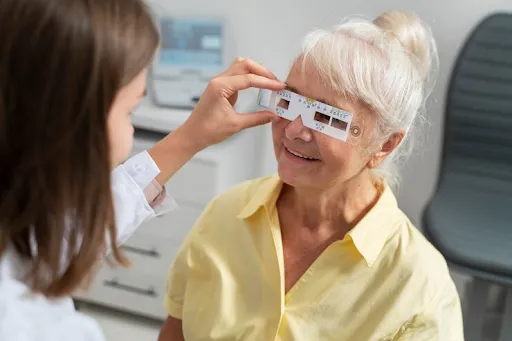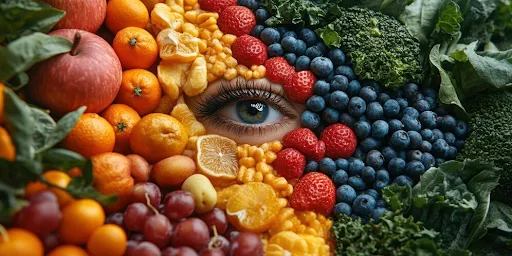The Importance of Nutrition for Eye Health
How Proper Nutrition Can Help Manage Age-Related Eye Conditions
FSDAVCFEBFEVSDDVFSD
FSDAVCFEBFEVSDDVFSD
FSDAVCFEBFEVSDDVFSD
Understanding Age-Related Eye Conditions
As people age, the risk of developing certain eye conditions increases. Common age-related issues include macular degeneration, cataracts, and glaucoma. These conditions can lead to vision impairment if not properly managed. While genetics and environmental factors play a role, nutrition is a critical and often overlooked factor in maintaining eye health as we age. Research shows that a diet rich in certain vitamins and nutrients can help slow the progression of these conditions and, in some cases, prevent them altogether.
For those experiencing early signs of eye issues, it’s important to consult with a healthcare provider who specializes in eye health. Regular eye exams can help identify problems before they worsen.
As people age, the risk of developing certain eye conditions increases. Common age-related issues include macular degeneration, cataracts, and glaucoma. These conditions can lead to vision impairment if not properly managed. While genetics and environmental factors play a role, nutrition is a critical and often overlooked factor in maintaining eye health as we age. Research shows that a diet rich in certain vitamins and nutrients can help slow the progression of these conditions and, in some cases, prevent them altogether.

For those experiencing early signs of eye issues, it’s important to consult with a healthcare provider who specializes in eye health. Regular eye exams can help identify problems before they worsen.

Key Nutrients for Eye Health
A diet rich in certain vitamins and antioxidants is essential for maintaining and protecting your vision. Vitamin A, prevalent in foods like carrots and sweet potatoes, is crucial for preventing night blindness and supporting overall eye health. This vitamin helps maintain the health of the cornea and supports normal vision function. Omega-3 fatty acids, found in fish such as salmon and mackerel, play a significant role in preventing dry eyes and reducing the risk of macular degeneration, a common age-related eye condition.
In addition to these, Vitamins C and E serve as powerful antioxidants that help shield the eyes from damage caused by free radicals. Vitamin C, present in citrus fruits and bell peppers, supports the health of blood vessels in the eyes and may reduce the risk of cataracts. Vitamin E, found in nuts and seeds, helps protect cells from oxidative stress, further contributing to eye health.
Incorporating these nutrients into your daily meals is a proactive approach to maintaining good vision as you age. For detailed information on vision-friendly foods and how they can prevent eye diseases, visit our section on preventing eye diseases
Foods That Support Vision Health

Green leafy vegetables like spinach and kale are excellent sources of lutein and zeaxanthin, which protect the eyes from harmful UV rays and lower the risk of cataracts. These nutrients help filter out blue light and safeguard the retina, contributing to long-term eye health. Incorporating these vegetables into your diet regularly can provide essential support for maintaining clear vision and preventing age-related eye conditions.

Maintaining a balanced diet is crucial for overall health and well-being, and it plays a significant role in preserving your vision as you age. Incorporating a variety of nutrient-rich foods into your meals can help manage and prevent age-related eye conditions such as cataracts, macular degeneration, and dry eyes. Consuming foods high in vitamins A, C, and E, as well as omega-3 fatty acids and antioxidants, can support long-term eye health and enhance visual function.
Incorporating nuts and seeds into your diet provides a boost of Vitamin E, an antioxidant that helps prevent oxidative stress and supports overall eye function. Adding fish such as salmon or mackerel increases your intake of omega-3 fatty acids, which combat dry eyes and reduce inflammation, promoting better visual comfort.
Maintaining a balanced diet is crucial for overall health and well-being, and it plays a significant role in preserving your vision as you age. Incorporating a variety of nutrient-rich foods into your meals can help manage and prevent age-related eye conditions such as cataracts, macular degeneration, and dry eyes. Consuming foods high in vitamins A, C, and E, as well as omega-3 fatty acids and antioxidants, can support long-term eye health and enhance visual function.
For personalized advice on improving your vision through nutrition, consider consulting our experts in vision health services. Our team can provide tailored recommendations based on your specific needs and dietary preferences. By working with our specialists, you can create a nutrition plan that not only supports overall health but also optimizes your eye health and reduces the risk of developing eye-related issues. For more information on how to get started, visit our vision health services page.
The Impact of Vitamins on Age-Related Eye Conditions
Vitamins play a pivotal role in maintaining eye health and managing conditions like macular degeneration. For instance, Vitamin A is critical for the production of rhodopsin, a protein that helps the eyes see in low light. Meanwhile, Vitamin C helps build collagen in the eyes, supporting the structure of the cornea and sclera. Consuming foods that are high in these vitamins, like citrus fruits and carrots, can prevent or slow the progression of various eye diseases. Studies have shown that people who maintain higher levels of these nutrients are less likely to develop cataracts and other vision-related issues.
For more details on age-related conditions and how they can be managed, read about age-related eye care. Early detection and regular check-ups can greatly improve outcomes for individuals experiencing vision issues as they age. Taking proactive steps can make a significant difference in maintaining your eye health and quality of life.
Long-Term Benefits of Proper Nutrition for Eye Health
Maintaining good eye health through proper nutrition involves incorporating small but impactful dietary habits into your daily routine. Dark, leafy greens like spinach and kale are rich in lutein and zeaxanthin, which help protect the eyes from harmful light exposure. Snacking on nuts and seeds provides Vitamin E, an antioxidant that shields the eyes from oxidative stress. Additionally, omega-3 fatty acids found in fatty fish such as salmon can reduce the risk of developing age-related macular degeneration. By making these simple adjustments to your diet, you can significantly enhance your eye health and reduce the risk of vision problems over time.
Staying hydrated is equally important in preventing dry eyes, a common issue as we age. Simple swaps, like using olive oil for cooking, can also increase your intake of eye-protecting nutrients. To learn more about how these and other lifestyle factors contribute to vision care. To learn more about how these and other lifestyle factors contribute to vision care, consult with your eye care professional for personalized recommendations. Prioritizing both hydration and nutrition can make a lasting difference in maintaining clear, healthy vision as you age.
Maintaining good eye health through proper nutrition involves incorporating small but impactful dietary habits into your daily routine. Dark, leafy greens like spinach and kale are rich in lutein and zeaxanthin, which help protect the eyes from harmful light exposure. Snacking on nuts and seeds provides Vitamin E, an antioxidant that shields the eyes from oxidative stress. Additionally, omega-3 fatty acids found in fatty fish such as salmon can reduce the risk of developing age-related macular degeneration. By making these simple adjustments to your diet, you can significantly enhance your eye health and reduce the risk of vision problems over time.


Staying hydrated is equally important in preventing dry eyes, a common issue as we age. Simple swaps, like using olive oil for cooking, can also increase your intake of eye-protecting nutrients. To learn more about how these and other lifestyle factors contribute to vision care. To learn more about how these and other lifestyle factors contribute to vision care, consult with your eye care professional for personalized recommendations. Prioritizing both hydration and nutrition can make a lasting difference in maintaining clear, healthy vision as you age.
Final Thoughts on Nutrition and Eye Health
By paying attention to the nutrients in your diet, you can take proactive steps toward protecting your vision as you age. A diet rich in essential vitamins, antioxidants, and omega-3 fatty acids can help reduce the risk of developing common eye conditions such as cataracts and age-related macular degeneration (AMD). Vitamins like A, C, and E, along with minerals like zinc, play a crucial role in maintaining eye health by fighting oxidative stress and inflammation, both of which contribute to the deterioration of vision over time. Nutrients found in dark leafy greens, carrots, and citrus fruits can provide these vital compounds.
Omega-3 fatty acids, typically found in fatty fish like salmon, are especially important for eye health. They help protect the retina from damage, reduce dry eyes, and lower the risk of developing AMD. These essential fats have anti-inflammatory properties that can support overall eye function and improve tear production. Including omega-3-rich foods in your diet at least twice a week can promote long-term eye health and reduce the likelihood of vision problems in later life.
While diet alone cannot cure conditions like cataracts or AMD, it can be a critical factor in slowing their progression. When combined with regular eye exams and treatments, maintaining a nutrient-rich diet can help preserve your sight for years to come. For more detailed advice on managing specific eye conditions through nutrition and other methods, visit our managing eye diseases page to learn more about how you can actively protect your vision.
Working With Your Healthcare Provider
It's always wise to discuss any dietary changes with your healthcare provider, particularly if you have pre-existing eye conditions. A tailored approach that includes both medical treatments and nutritional adjustments can significantly support your overall vision health. Your healthcare provider can guide you on the best foods and supplements to incorporate based on your specific needs.

It's always wise to discuss any dietary changes with your healthcare provider, particularly if you have pre-existing eye conditions. A tailored approach that includes both medical treatments and nutritional adjustments can significantly support your overall vision health. Your healthcare provider can guide you on the best foods and supplements to incorporate based on your specific needs.
In addition, regular eye exams are essential for tracking the progression of any condition and adjusting your care plan as necessary. Partnering with a vision specialist ensures you receive personalized advice and care, tailored to your unique needs. For more guidance on working with a specialist, explore our comprehensive eye care services
In addition, regular eye exams are essential for tracking the progression of any condition and adjusting your care plan as necessary. Partnering with a vision specialist ensures you receive personalized advice and care, tailored to your unique needs. For more guidance on working with a specialist, explore our comprehensive eye care services
Continuing the Journey to Better Eye Health
Maintaining good eye health is a lifelong journey that demands consistent attention to both medical care and lifestyle choices. A vision-healthy diet, rich in essential vitamins, antioxidants, and omega-3 fatty acids, can play a significant role in protecting your eyes and preventing common age-related conditions. Alongside dietary adjustments, staying informed about the latest research and best practices in eye care is crucial for making informed decisions about your health.
Working closely with your healthcare provider ensures that you receive personalized advice and effective treatment plans tailored to your specific needs. Regular eye exams are also vital for monitoring your eye health and adjusting your care as needed. For additional resources on maintaining long-term eye health and staying proactive in your vision care, Contact Us.

Contact Info
Hours of Operation
Mon - Fri | 9:00 AM - 5:00 PM
Sat - Sun | Closed
Holiday Hours: We are closed for the following holidays: New Years Day, Memorial Day, Independence Day, Labor Day, Thanksgiving Day, Christmas Day
© 2026 Kleinwood Vision. All rights Reserved.


